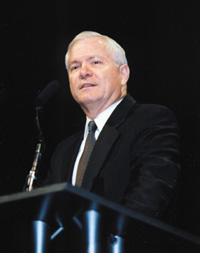Robert Gates pessimistic about Iraq saying US not winning war
The Senate voted overwhelmingly Wednesday to confirm Robert Gates as defense secretary, with Democrats and Republicans portraying him as the man who will help overhaul President Bush's Iraq policies.

The 95-2 vote was a victory of sorts for Bush, who named Gates to replace Donald H. Rumsfeld at the Pentagon on Nov. 8, a day after voters gave Democrats control of Congress for next year.
Even so, much of Gates' support stemmed from his pledges to consider new options in Iraq.
Overshadowing the vote was the release of an independent study lambasting Bush's approach to the war, increasing pressure on the White House to change course.
"I am confident that his leadership and capabilities will help our country meet its current military challenges and prepare for emerging threats of the 21st century," Bush said in a statement after the Senate vote.
He said Gates had shown during his confirmation hearing this week before the Senate Armed Services Committee that he is "an experienced, qualified, and thoughtful man who is well respected by members of both parties and is committed to winning the war on terror" the AP reports.
Robert Gates said Tuesday that the US is not winning the war in Iraq, and that failure there could help ignite "a regional conflagration" in the Middle East.
Gates told senators that the US went to war in Iraq without enough troops, as some generals said at the outset of the conflict.
The statements about the situation in Iraq came during an exchange with Republican Senator John McCain during Gates' confirmation hearing before the Senate Armed Services Committee.
"We are not winning the war in Iraq, is that correct?" McCain asked.
"That is my view, yes, senator," Gates replied, adding shortly afterward that the US is not losing the war either.
"There clearly were insufficient troops in Iraq after the initial invasion," Gates said. While he said that he envisions "a dramatically smaller" number of US troops there, he said a US presence would be required "for a long time."
Developments in Iraq "in the next year or two" will shape the future of the entire Middle East, Gates said in describing the possibility of a "regional conflagration" arising out of the Iraq bloodshed.
Gates told the senators at the outset that he is "open to a wide range of ideas and proposals" about what to do in Iraq, and that the US's overall goal should still be an Iraq that can "sustain itself, defend itself and govern itself," the objective that Bush has long set out, taipeitimes.com says.
Source: agencies
Prepared by Alexander Timoshik
Pravda.ru
Subscribe to Pravda.Ru Telegram channel, Facebook, RSS!





